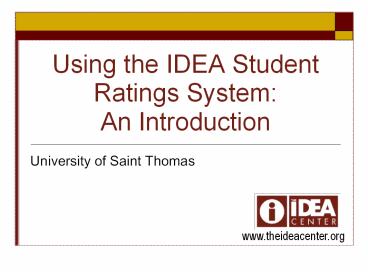Using the IDEA Student Ratings System: An Introduction - PowerPoint PPT Presentation
1 / 33
Title:
Using the IDEA Student Ratings System: An Introduction
Description:
Smaller courses ( 15) have less reliable results. Page 1: Global Assessment ... 10 consultants have been trained on the IDEA system; see FD website: ... – PowerPoint PPT presentation
Number of Views:65
Avg rating:3.0/5.0
Title: Using the IDEA Student Ratings System: An Introduction
1
Using the IDEA Student Ratings SystemAn
Introduction
- University of Saint Thomas
www.theideacenter.org
2
Plan for this Session
- Review IDEA Student Learning Model
- Review Using IDEA
- Forms
- Course objectives and syllabus
- Using IDEA to guide teaching improvement efforts
- Resources for help with IDEA
3
Reflective Practice with IDEA A Piece of the
Puzzle
- IDEA student evaluation
- Peer Review
- Self Reflection
Collect Feedback
Improve
Interpret Results
Reflect Discuss
Read Learn
4
Student Learning Model Assumptions
- Effective teaching is assessed by students
perception of their learning - Learning is based on progress toward specific
objectives chosen by the instructor - See handout on Directions to Faculty p. 2
5
What is the IDEA system?
- Faculty Information Form
- Student Ratings of Instruction
- Diagnostic (long) Form OR
- Short Form
- Reporting System (4-page report)
6
Forms Overview
7
Faculty Information Form
- Learning objectives
- Course and Instructor information
8
Course Description Items
- Optional
- Best answered toward end of term
- Do NOT influence your results
- For departmental reports, not individual
Bottom of Page 1
9
Learning Objectives
- Types of learning that reflect the instructors
primary goals in the course - May be discipline specific
- May be course-level specific (intro vs advanced)
- Should be chosen based on course activities that
specifically develop student competencies that
are assessed - Choose 3-5 for any one course
- some are Essential ( primary importance)
- Some are Important ( secondary importance)
- Essential objectives valued twice as much as
Important objectives - Minor importance objectives do NOT influence
results!
10
Faculty choose only 3-5 LEARNING OBJECTIVES that
are essential or important in a particular course
11
Best Practices
- Discuss meaning of objectives with students
- Early in the course (e.g., first day!)
- Inform students they will be asked to rate their
own progress on objectives at the end of the
semester - Have students reflect on their understanding of
course purpose and how parts of course fit your
chosen objectives - Clarify differences in perception of objectives
meanings (student vs instructor) - Show students how they are making progress on
objectives with constructive feedback
12
Integrating objectives into course design an
example
- Goals and Expectations My three objectives in
this course are for you to - 1. Learn to analyze and critically evaluate
ideas, arguments, - and points of view
- To do this, you will read and critique scholarly
articles and participate in class discussions. - 2. Develop skill in expressing yourself in
writing - To do this, you will propose a written research
project in APA format. - 3. Learn how to find and use resources
- To do this, you will use scholarly books and
articles for your research proposal
13
Student Form Diagnostic (Front)
- Rate teaching methods (1-20)
- Rate progress on 12 learning objectives (21-32)
14
Teaching Methods
- This section used for formative information only
-- not for assessment of teaching effectiveness - Instructors are not expected to rank highly in
all 20
15
Teaching methods
16
Learning Objectives
- Data are used for both formative and summative
assessments - Student ratings reported only for instructors
chosen Essential or Important objectives - 1 (no progress) to 5 (exceptional progress) scale
17
Learning Objectives
- Only 2-5 per course should be emphasized
18
Student Form Diagnostic (back)
- Student/course characteristics
- Information for adjusting raw scores
- Effort (37)
- Motivation for taking course (39)
- Work habits (43)
- Comments
19
Why assess motivation and work habits of students?
- Strong correlations of motivation and work habits
with learning - Provide corrective measure for raw scores
20
Short Form
- Assess learning objectives only
- No teaching methods surveyed
- Student information effort, work habits,
motivation - Back of form for comments
21
Report Overview
22
The IDEA Diagnostic Form Report
- What were students perceptions of their progress
on my learning objectives? - What are overall assessments of the course and me
as a teacher? - What might I do to improve my teaching?
23
Smaller courses (lt15) have less reliable results.
24
Page 1 Global Assessment
- A.Weighted average of progress on instructor
selected (relevant) objectives - B. Overall, I rate this instructor an excellent
teacher (41) - C. Overall, I rate this course as excellent (42)
25
(No Transcript)
26
Page 2 Student Progress
- Report of progress on Essential or Important
objectives - Student perceptions of course demands
- Student self-assessment of motivation, academic
effort, and work habits
27
(No Transcript)
28
Page 3 What might I do differently?
29
Page 3 What might I do differently?
- Most important teaching approach for all learning
objectives - Stimulating Student Interest
30
- Relationship of Learning Objectives to Teaching
Methods - See handout
31
IDEA Resources
- Classroom Consultants can help with
- Choosing objectives and integrating them into
your course - Filling out Faculty Information Forms
- Interpreting results
- Providing formative suggestions and teaching
resources - 10 consultants have been trained on the IDEA
system see FD website - http//www.stthomas.edu/fdc/facultyResources/class
roomConsulting.html
32
IDEA Website Resources
- http//www.theideacenter.org/
- Support Student ratings Faculty Information
Form - pdf files on Choosing Objectives
- Video training
- Knowledge base IDEA papers, POD-IDEA Notes on
Instruction (Teaching Behaviors 1-20) and
Learning (Objectives 1-12)
33
Questions?































